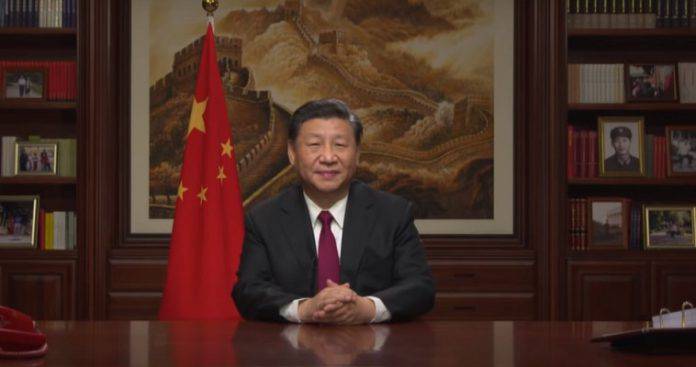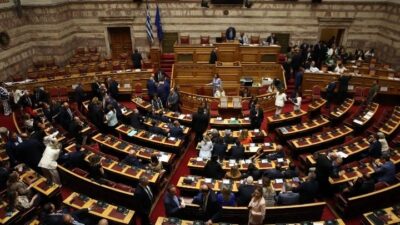Alexandros Tarkas: Greece in the nets of the Cold War between the West and China
03/09/2020
China is attempting a sudden and clumsy intervention in the affairs of Greece, in the midst of the confrontation with Turkey and the critical contacts with NATO and the EU, seeking to promote its economic and strategic interests throughout Southeastern Europe.
According to reliable information, a senior official of the Communist Party of China and a confidant of President Xi Jinping will meet in the coming days with Kyriakos Mitsotakis and a small number of selected ministers. Beijing’s priority is the contracts of the 5G telecommunication networks, the expansion of COSCO’s activities and a series of EU issues, as Greece is considered a vulnerable gateway to its processes.
With the exception of the mediation of the German Foreign Minister and the arrival of his Italian counterpart for the EEZ, the Chinese official’s hasty trip is essentially the first official visit by a foreign official since the beginning of the Covid-19 crisis.
It will take place before the European Council of September 24 and before the third round of the Greece-US Strategic Dialogue at the end of the month. It shows that China is rushing to take advantage of its position as a permanent member of the UN Security Council, where a lot may hang in the balance if there is an armed conflict with Turkey.
China does not have the luxury of waiting
China does not have the luxury of waiting, because: First, Kyriakos Mitsotakis is now creating the impression (in Washington as well) that, despite initial hesitations, he will not give in to Chinese demands for 5G. The US attaches great importance to the security of telecommunications networks (5G “Clean Path” initiative), calling for the exclusion of “unsafe suppliers”, such as the Chinese Huawei and ZTE.
The PM’s office highlighted the use of a special encryption device of the American embassy, during the recent Mitsotakis-Trump telephone communication, ostensibly as a sign of a privileged relationship. In fact, it was the public revelation (with government responsibility) of the lack of trust in the Greek communications networks. The US embassy joined the “5G Clean Path” at the end of July and will demand protection measures for the telecommunications of the US forces stationed at Greek bases (Souda, Stefanovikio, etc.).
Second, COSCO suffered a tolerable reduction in freight traffic in Piraeus due to Covid-19. However, the firm is concerned about the non-promotion of its plans for the fourth pier and the operation of a shipbuilding zone, as it is not completely satisfied with the relevant decision of the Council of State in June.
Thirdly, at the (via video conference) EU-China summit in June, there was no progress in trade relations and the economic Agenda 2025. The EU also continues to oppose China’s cooperation with 17 countries in Central and Eastern Europe, despite the participation of several of its members. Greece has been participating in “17 + 1” since May 2019 and is considered a hub for trade, investment, and some infrastructure projects.
Warnings from the West
At the same time, the talks of the Chinese official will revive the questions of the western governments about the causes and the way Beijing influences the Greek leadership. Their reasoning underlines that, after the careful, balanced and beneficial for the Greek interests agreement of Costas Karamanlis with COSCO in 2006, the next governments did not show due care, so that the Chinese investment does not become one-sided, in order to avoid political side-effects.
Even experienced former PM Antonis Samaras, on the one hand, distinguished himself in the methodical blockade of the Russian Gazprom and Sintez in the privatization program, on the other hand, announced in July 2014, readiness to provide support, maintenance and repair services to China’s warships, which are NATO’s main enemy. During SYRIZA, former foreign minister Nikos Kotzias successfully negotiated a bilateral Memorandum of Understanding for the “One Belt One Road” initiative, which was later distorted by Alexis Tsipras’s staff.
Last year, President Emmanuel Macron and Chancellor Angela Merkel raised the issue of Franco-German concerns over Chinese influence and the lack of Greek co-ordination with the other members of the EU, saying that US Secretary of State John Kerry had asked similar questions. China’s enticing economic proposals primarily serve its military and strategic plans.
Despite Western warnings, Kyriakos Mitsotakis stood out, at least in the first months of his term, as the most fanatical supporter of cooperation with China. However, almost none of his demands to President Xi Jinping, from November until today, have been met.





